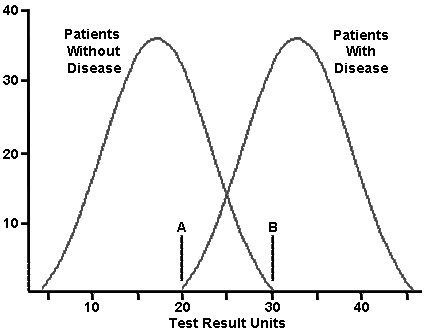I feel I need to back up a little bit and discuss how the church is harmed by the barriers to leaving the church I'll be discussing in my next few posts, as well as yesterday's. To do it, I have to first go over some medical decision-making strategy. Please bear with me. And, for the record, I am not implying in the following that either religious or atheist people have a disease; it's just a metaphor.
In the context of barriers to leaving the religion into which one is born, the two groups being compared would be not people with or without a disease, but "True Believers" and "non-True Believers". The "diagnostic test" being "administered" is the questioning person's own judgment of whether or not to leave the religion. The barriers to leaving the religion are factors that move the "cutoff point" such that there are more false positives, which would be people who stay in the church who based on their degree of faith/beliefs should leave.
So given these barriers to leaving, you wind up with lots of people staying in the church despite not having true belief. Is such an idea an unfair attack on the church? Actually, a fellow by the name of Jesus said in Matthew 7 that "wide is the gate and broad is the road that leads to destruction, and many enter through it. But small is the gate and narrow the road that leads to life, and only a few find it." He goes on to say “Not everyone who says to me, ‘Lord, Lord,’ will enter the kingdom of heaven, but only the one who does the will of my Father who is in heaven. Many will say to me on that day, ‘Lord, Lord, did we not prophesy in your name and in your name drive out demons and in your name perform many miracles? Then I will tell them plainly, ‘I never knew you. Away from me, you evildoers!’"
Jesus predicted a situation where many within the church would not be true believers. It is my assertion, which I will discuss over the rest of the series of posts, that these barriers to leaving the church harm both those who would otherwise leave the church and the church itself, by keeping non-believers in the pews. I certainly don't want the series to be interpreted as against religion. With that in mind, the final post of the series will be a proposal on how the church can repair itself by returning to its pre-Constantine roots.

No comments:
Post a Comment